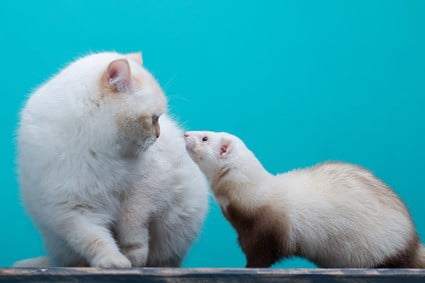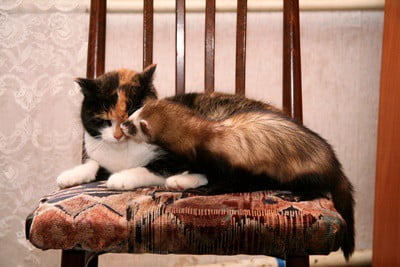Ferrets are curious, playful, and friendly animals. Their personality can be a good match for cats. They’ll bond over chasing toys, climb up hard-to-reach areas, and share food. However, cats and ferrets are still predators, and fights can be deadly. If your ferret is overly playful or your cat is particularly annoyed, it could escalate into a dangerous conflict.
Cats and ferrets get along. In most cases, they ignore each other, with the cat maintaining its distance and the ferret knowing better than to annoy the cat. However, some ferrets will torment the cat, and some cats will play too roughly with the ferret. To limit conflicts, introduce the two pets slowly and break up any fights.
Even if cats get along with ferrets, they’re rarely best friends. Instead, they’ll play now and then or completely ignore each other. If they’re raised together from an early age, they may become friends. However, some cats will be annoyed by an overly energetic ferret, and other cats may be confused by the new companion.
Do Cats Like Ferrets?
Cats don’t necessarily like ferrets, but the two are known to get along. The likelihood of this happening depends on:
- How they’re introduced
- Their individual temperaments
- How much space each animal has
- Their respective ages
- How closely they’re monitored
Most cat and ferret owners report that the cat will ignore the ferret. In contrast, the ferret will have a respectful interest toward the cat but rarely be aggressive.
Even still, there’s still a chance for fights to break out. This is mainly due to the personality of both animals. Ferrets that have previously had bad experiences with cats will be warier of the felines and act defensively.
Cats that are feistier or more playful will likely approach ferrets, leading to heavy-handed playing.
Can Cats And Ferrets Be Friends?
Ferrets are naturally curious and rambunctious. While cats are also known for these personality traits, that’s tempered by their more aloof nature.
Since they’re from different species, a cat and ferret may not pick up on each other’s body language. This can lead to misunderstandings and let fun interactions quickly devolve into conflict.
For example, one may pester the other until it lashes out, unaware that it was going too far. Likewise, they may play-fight until one becomes injured, not realizing that the fun had ended and a fight had begun until it’s too late.
There may be a notable size difference. The cat may be large enough to dominate the ferret in a play fight, which can be harmful. If you own a kitten, the ferret will out-weigh it and may get too rough.
Both have keen hunting instincts and a willingness to antagonize things that interest them. When you mix that with a size difference and unique body language, it can be a recipe for disaster.
Cat and ferret are more likely to become friends in the following situations:
- Cats that are curious, but not overly playful
- Ferrets that are not easily spooked and are mindful of their nipping
- Cats and ferrets who grew up together
Juvenile ferrets and kittens are less likely to initiate a fight. Most of all, both will be curious toward each other. This can help them learn how to play nice and interact politely, rather than diving in head-first as adults.
If you want to make these animals friends, not just begrudging roommates, introduce them at a young age.
Will My Cat Hurt My Ferret?
Cats often ignore ferrets and may outright avoid them.
This can confuse cats, leading them to ignore the strange animal. However, some cats will steer clear of ferrets at all costs. This is because your cat decides the ferret is a nuisance.
Ferrets move too quickly for cats and can climb into places they cannot. More playful ferrets will even try to approach cats and burrow into their fur.
Ignoring and avoiding are the common responses of a cat. However, aggressive cats, unfixed cats, or a cat that’s had enough may attack the ferret.
Cats can easily scratch, bite, and kick ferrets. Ferrets may hold their own. They’re agile and have claws and teeth. Each animal can defend itself, all while inflicting harm on the other.
Do Cats Eat Ferrets?
Ferrets aren’t the natural prey of cats, and cats don’t have the instinct to hunt them for food. Ferrets are the right size for a cat’s prey, but a ferret’s behavior and smell say otherwise.
Cats may still hurt ferrets in other ways. Even if they’re not a meal option, they can still be a fun toy to bat around, a nuisance to chase, or a problem to kill. So, it’s important to monitor how your two pets react to each other. Once a fight breaks out, it doesn’t take long to become dirty.
Are Ferrets Dangerous To Cats?
Ferrets have sharp teeth and claws that they can easily use in a fight. This is complemented by their slender body, which allows them to dart in and out of danger. Ferrets can cause damage to cats with a bite force of 110-120 psi.
With that said, a ferret’s defenses are considered to be inferior. They have more biting strength than cats, but they lack in size, weight, and even the length of their teeth and claws. Cats will more easily pin a ferret and inflict grievous wounds with its 30 sharp teeth and retractable nails.
Ferrets have bad eyesight. This makes it easier for cats to sneak up on the nimble animals and catch them off guard. While cats have worse eyesight than most humans, they can still outclass a ferret.
Ferrets make up for their poor eyesight with good hearing and sensitive feet, but cats have these abilities too. In most cases, a ferret will lose to a cat in a fight.
Both will come out scratched, wounded, and traumatized. That makes it wise to take every precaution when housing these two pets together, especially when introducing them.
Similarities Between Cats And Ferrets
Many people choose ferrets as a second pet because cats and ferrets have similarities. These shared traits also make the creatures more likely to get along than, say, a hamster and a cat.
Temperament
Cats and ferrets have similar temperaments. Both are inquisitive and curious animals.
Cats are inquisitive of new things and love to explore strange objects or structures in their area. However, ferrets express their inquisitive nature through play.
Ferrets are willing to wrestle, tumble, and bat at toys. Like cats, they are most active at dawn and dusk and may sprint around the house after dark.
However, ferrets are much more sociable and friendly, willing to show more outward affection than most cats.

Diet
The main shared trait of a cat and ferret is their diet. Both animals belong to the same order, Carnivora. As the name implies, animals in Carnivora are meat-eaters that hunt or scavenge for their food. They cannot eat plants and rely on gaining all nutrients from animal products.
Both cats and ferrets need to be fed a diet high in protein. They also require a high amount of fat, matched to relatively small amounts of carbs and fiber.
They can gather this by hunting small prey, but most will rely on you to provide their meals. Other than commercial ferret food, ferrets can be given mink food or cat food, according to Veterinary Clinics of North America Exotic Animal Practice. Indeed, if you need to save a bit of money, or you’ve run out of ferret food, cat food can do in a pinch.
Ferrets can eat kitten food as a way to gain all the necessary proteins and fat they require. Adult cat food, however, will lack protein. Your cat and ferret aren’t able to share meals after a certain age, and you’ll need to invest in high-protein ferret food.
Pet Needs
Cats and ferrets have very similar needs as a pet. If you have a cat-friendly household, a ferret can easily slot in without forcing you to buy new equipment or toys. They can share the same:
- Play area
- Toys
- Treats
- Litterbox
The only real difference will be the need for a ferret cage. Ferrets are likely to tear up decorations, knock over objects, and shred fabric if left unattended. Even though cats are known to be playfully destructive, ferrets take it up a notch.
Likewise, ferrets are happy to sneak outdoors without your permission. Because they are smaller than cats, and in some ways more nimble, they can use escape routes that your cat cannot.
While an indoor cat may fear the great outdoors, a ferret will have no hesitation. Your new pet should not be allowed outside of its ferret cage unless your home (and all exits) are ferret-proofed.
Are Ferrets Related To Cats?
People often think of ferrets as rodent-like animals. Indeed, a ferret’s slender body, whiskers, and pointed nose give it a rat-like appearance. However, these pets are more closely related to your cat.
Ferrets belong to the order Carnivora, which includes dogs and cats. Meanwhile, rats and mice belong to the order Rodentia.
Although not closely related, ferrets share more personality traits, habits, and a diet with cats than any rodent. There are some crossover traits with dogs, but for this particular species, they lean toward cats. Other creatures in their family, such as minks, otters, weasels, and badgers of the mustelid family, share more traits with dogs, depending on their size.
Do Ferrets Play With Cats?
Ferrets are curious, playful animals. They are more outgoing than cats and will be eager to play. This is especially true with long-haired cats. Ferrets will view the hair as soft, fascinating, and great to burrow into. Your feline may become the new and wonderful obsession of your ferret.
Because of this, owners report that ferrets usually initiate a friendship or any play sessions. If your cat feels like playing, the two may chase and bat at each other. Since ferrets don’t smell or move like prey, the cat is unlikely to engage its hunting instincts and attack the pet. Instead, they’ll wrestle gently until they’re bored.
However, when your cat doesn’t feel like playing, it may become annoyed by the ferret. That’s especially true for cats that don’t have other companions (aside from you). They’ll be used to living a solitary, unhurried lifestyle. The presence of a boisterous ferret may grate on its nerves.
For this reason, the cat may ignore the ferret until it gets bored and leaves. If the ferret is persistent, it may become aggressive and bat at the ferret to warn it off.
Can Ferrets Eat Cat Food?
Ferrets can safely eat kitten food or adult cat food that does not include fish. That’s because these nimble pets dislike the flavor and tend to produce more body odor when given fish. Although their digestive system can handle it, it can lead to your ferret rejecting meals long-term.
Cat food that includes chicken, lamb, or beef will be perfectly safe. According to another article from the Veterinary Clinics of North America Exotic Animal Practice, this cat food should contain at least:
- 15% fat
- 30% meat source protein
- Less than 30% carbohydrates
The cat food you buy should also be high quality. Lower-end cat foods often have fillers made of grains and other carbohydrates. These ingredients are not very nutritious, but cats can digest them without much problem. Ferrets cannot digest fiber as well as cats do. Over time, they will:
- Struggle to process other nutrients
- Become vitamin deficient
- Feel lethargic and tired
Alternatively, you can look into cat food specifically made for kittens. Kitten food often contains more protein and is mixed with supplements. Ferrets need a great deal of fatty acid, which kitten food has in abundance.
How To Introduce Ferrets To Cats
How you introduce your pets will dramatically affect how well they get along. Here’s the best way to proceed:
Prepare The Ferret’s Cage
Ferrets should not be allowed to roam free if you’re not present to supervise. Not only can they damage your home. They may get into fights with your cat that can escalate before you notice.
It is crucial to set up your ferret cage long before introducing it to your cat. This also gives your ferret a safe place to retreat if it gets stressed or scared off by the cat.
The ideal cage will have a strong lock. Ferrets are clever escape artists and may learn to open their cages otherwise.
A ferret’s cage should be at least 24 inches in length and width and 18 inches in height. This space will allow your ferret to retreat from an aggressive cat. The hiding space will also limit how much stress your ferret endures as it adjusts to a new home.
Your ferret will spend a lot of time in its cage, so make sure it’s comfortable. Place toys inside, like boxes, tubes, and paper bags. You should also give it places to sleep, like blankets and hammocks.

Allow Your Cat Near The Cage
With the area prepared, let the cat approach the cage. You shouldn’t stand between them or hover too close, as this will make the two retreat. They’ll both be on edge because of the new presence, so rushing will scare them off.
Instead, stay just close enough to intervene if your cat becomes aggressive. Allow your cat to sniff the ferret and its cage. If your cat shows signs of aggression, reprimand it with a stern ‘no’ and immediately remove your cat. This will teach the feline that aggression toward your ferret will not be tolerated.
Continue this until both your ferret and cat feel comfortable. It may take several days, with many short sessions. Even still, it’s never wise to rush it, or else the two will associate each other with stress.
Let Your Cat Sniff The Ferret
Once your cat and ferret are comfortable, you can gingerly remove the ferret from its cage. If you can enlist a helper to secure the cat while you hold the ferret, that’s even better.
No matter the case, hold your ferret securely, allow the cat to approach, and encourage it to sniff the new pet. While this happens, let your ferret sniff the cat too. If either one shows aggression, back them away, reprimand them, and try again once they’re calm.
Repeat this step until neither animal shows aggression. It may take a week or two before they seem to recognize one another and remain calm.
Allow Your Animals To Play
You can place your ferret on a leash and allow it to roam near your cat. This allows you to yank the ferret back if a fight breaks out. It also encourages the cat to react more naturally with the ferret.
If the cat doesn’t show aggression and appears to ignore the ferret even when you’re at a distance, it’s a good sign. If the ferret bothers the cat too much, and you sense a fight brewing, then lead the ferret away and force it to maintain some distance.
With these practice sessions, you can see how well your ferret and cat like each other. If they act friendly, allow them to play by offering toys or treats; whenever they are polite or indifferent, praise and reward them.
After 2-3 weeks, if you have no signs of fighting or aggression, you can remove the leash from your ferret. You should remain close by to intervene if necessary, but you don’t need to be as vigilant.
Adding a ferret to your cat household is a daunting task. As long as you take precautions and understand their individual personalities, your two pets should get along.

